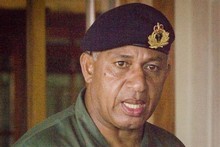BREAKING NEWS
Auckland
Council puts brakes on port expansion into harbour..
A return to the rule of law is hamstrung by the benefits members of the ruling regime enjoy, and by state-sanctioned intimidation of dissenters.
In November members of the Law Society of England and Wales visited Fiji on an undercover mission and interviewed past and present lawyers, judges, diplomats and people in non-government organisations.
Their report Fiji: The Rule of Law Lost found a system of governing that was not "transparent, certain, predictable, accountable or democratic".
Foreign Minister Murray McCully said the report was "not very encouraging" but pointed to steps Fiji was taking towards holding elections.
These included a commitment to a public consultation process and a voter registration programme.
Mr McCully said the jury was out and he wanted to keep an open mind.
Fiji has been under military rule since 2006, when Frank Bainimarama seized power. He has promised elections in 2014.
The report found that judges and prosecutors had been fired without reason, the state had censored the media and the regime abused its power to intimidate its critics.
"The judges dismissed in April 2009 were given no reasons, no notice and no compensation for loss of office," the report said. "It is apparent that their sin was to comply with their oath of office and to act independently rather than any misconduct. It is difficult to conceive of a more obvious attack on judicial independence."
Many of the state's prosecutors were also replaced with lawyers from Sri Lanka on short-term contracts, the report said.
The report called all national law societies and bars to lobby governments to press for measures to be taken by the Fiji Government to ensure a return to the rule of law.
Labour's foreign affairs spokesman Phil Goff said the report was damning, but he did not think harsher sanctions on Fiji were the answer.
Economic sanctions hurt ordinary people without necessarily having the desired impact on the regime.
INTIMIDATION
* Dorsami Naidu, president of the Fiji Law Society and vocal critic of the Government, was detained by police for 24 hours after protesting peacefully outside a High Court building.
* Hemendra Nagin, a lawyer who led a petition against the forcible removal of the Chief Justice in 2007, was fined $15,000 for professional misconduct.
* Human rights lawyer Imrana Jalal was charged under a decree that did not come into force until two months after she was charged. She was eventually acquitted, but lives in exile.
* Graffiti artists have been charged with sedition.


No comments:
Post a Comment